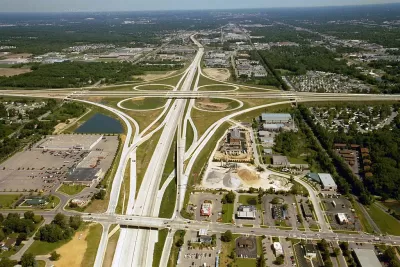The gas tax, suburban highway spending cycle is both self-serving and self-destructive, according to this article.

"Higher gas taxes are (likely) coming across the Midwest, framed by Ohio, Michigan and Wisconsin Democrats and Republicans alike as an offensive against potholes — but in reality a boondoggle that will soak taxpayers and create more of the car dependence that has devastated Midwestern cities like Detroit, Cleveland and Milwaukee," according to an article by Angie Schmitt.
The article breaks down the problem with the new gas tax in each of these states, starting with Michigan. Michigan's proposed gas tax increase of 45 cents would raise up to $2.5 billion a year. While the gas tax has been promoted by a campaign website titled "Fix the Damn Roads," the Michigan Department of Transportation doesn't want to stop with fixing old roads. They want to build new roads.
The state is planning two highway projects for the Detroit region alone totaling $4 billion. According to official population estimates, Southeast Michigan’s population grew only about 1 percent between 2010 and 2018. The growth that did occur was concentrated in the suburbs that these highways are designed to serve. During the same period, Wayne County — where Detroit is located, lost 3.8 percent of its population. Meanwhile, suburban Oakland County grew 4.5 percent.
The stories from Ohio are similar, and Schmitt connects the dots to make the point that highway expansions tend to benefit sprawl while perpetuating the inequities and lack of financial resilience that plagues many of the urban areas in these states.
FULL STORY: Midwest Will Raise Gas Taxes — And Make Everything Worse

Planetizen Federal Action Tracker
A weekly monitor of how Trump’s orders and actions are impacting planners and planning in America.

Maui's Vacation Rental Debate Turns Ugly
Verbal attacks, misinformation campaigns and fistfights plague a high-stakes debate to convert thousands of vacation rentals into long-term housing.

Restaurant Patios Were a Pandemic Win — Why Were They so Hard to Keep?
Social distancing requirements and changes in travel patterns prompted cities to pilot new uses for street and sidewalk space. Then it got complicated.

In California Battle of Housing vs. Environment, Housing Just Won
A new state law significantly limits the power of CEQA, an environmental review law that served as a powerful tool for blocking new development.

Boulder Eliminates Parking Minimums Citywide
Officials estimate the cost of building a single underground parking space at up to $100,000.

Orange County, Florida Adopts Largest US “Sprawl Repair” Code
The ‘Orange Code’ seeks to rectify decades of sprawl-inducing, car-oriented development.
Urban Design for Planners 1: Software Tools
This six-course series explores essential urban design concepts using open source software and equips planners with the tools they need to participate fully in the urban design process.
Planning for Universal Design
Learn the tools for implementing Universal Design in planning regulations.
Heyer Gruel & Associates PA
JM Goldson LLC
Custer County Colorado
City of Camden Redevelopment Agency
City of Astoria
Transportation Research & Education Center (TREC) at Portland State University
Jefferson Parish Government
Camden Redevelopment Agency
City of Claremont





























